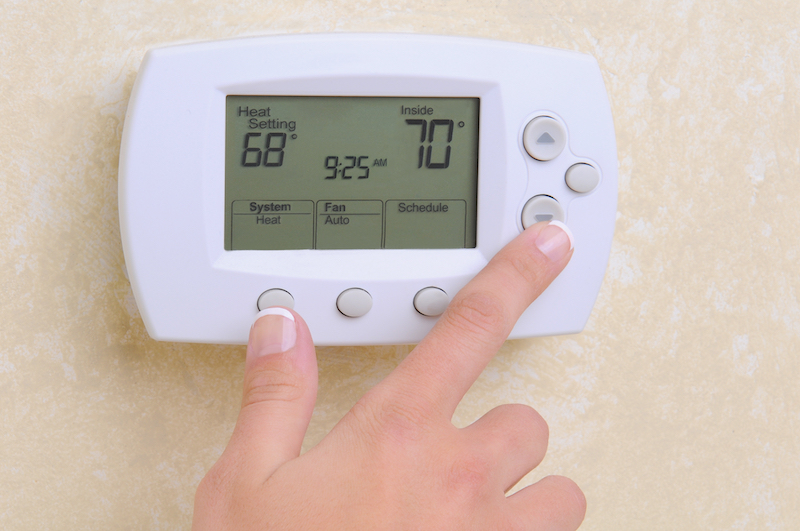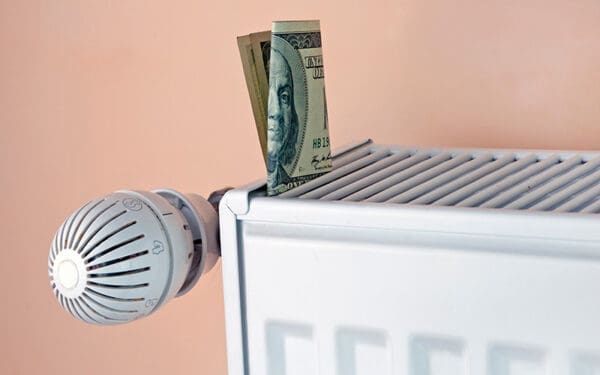
It's time to stop having to choose between keeping our homes warm or sacrificing our health and the climate. A well-designed Clean Heat Standard can help. Photo: Shutterstock.
If you live in a home with an oil or gas furnace or boiler, like most people in Massachusetts, turning up the heat is the end of an unseen odyssey for your heating fuel. Between drilling, refining, and transport, fuels can travel thousands of miles before they are delivered into homes and burned for heat. Clearly, there’s a lot more to protecting our buildings from the frigid cold than turning a thermostat on.
Unfortunately, almost every stage of this process favors dirty fossil fuels that damage our climate and our health. In fact, the negative health impacts of fuels like natural gas now surpass coal. And, with over half of state residents relying on gas for heating and 23% on oil and propane, fossil fuels are clearly dominating the Commonwealth’s heating systems. So how can we transition off these fuels without sacrificing affordable home heating?
Massachusetts decision makers think that a new government program, called the Clean Heat Standard, can slash polluting emissions while protecting our climate and our loved ones. Since this program is currently under development, CLF took a deep dive to see just how clean it would actually be. Here’s how it might work:
How Would a Massachusetts Clean Heat Standard Work?
A Clean Heat Standard would be run by environmental regulators. It would require companies that sell polluting fuels (primarily gas, oil, and propane) to change how they serve their customers or pay a fee into programs encouraging customers to adopt electric heating systems.
What does this mean for you if you use gas or oil to heat? Under a well-designed program, fuel companies and gas utilities could transition some customers to cleaner heating options, like a geothermal network using heat pumps to capture the natural heat generated underground by the earth. They could also pay another company to help customers weatherize their homes or install heat pumps.
Would the Program Help Everyone?
The reality is that converting to clean heating technology requires financial investments, and we can’t leave anyone behind in our clean energy transition. Failing to include all families and businesses in our climate action is inequitable. It means that some communities and individuals will be exposed to more pollution than others. That’s not fair. Not only that, but families remaining on gas will face higher bills as utility companies try to compensate for their loss of customers.
These outcomes are unacceptable. That’s why we need to ensure that families historically left behind by government energy programs are at the front of the line this time around. We also need to seek more funding from other state and federal resources to help all families transition to clean heat and reap its lifelong health and climate benefits. For example, Mass Save (Massachusetts’ energy efficiency program) could expand its financial rebate and loan programs. Those programs can help pay part of the cost of installing heat pumps, making them affordable to more people. Environmental regulators must carefully design a Clean Heat Standard so that customers who spend the highest proportion of their incomes on their heating homes and businesses get the most benefit.
Can a Clean Heat Standard Slash Climate-Damaging Pollution?
Potentially – especially given the fact that most Massachusetts residents depend on fossil fuels for heat. Transitioning to cleaner heating systems will have an immense impact in slowing climate change and protecting our health. But a program like the Clean Heat Standard will only be useful for reducing climate pollution if it has a laser focus on helping people electrify their homes. Some versions of a Clean Heat Standard would allow fuel companies to blend in other fuels to their existing product — which is a mistake. Such alternative fuels, like so-called “renewable” natural gas or other biofuels, are false solutions that Big Gas and Oil use to maintain business as usual. These fuels still damage our climate and our health.
Massachusetts’ climate laws require drastically slashing pollution by 2030 on the way to net zero by 2050. Even former Governor Baker’s climate and energy team acknowledged that continuing to burn fuels, including alternative fuels, to heat homes and businesses can’t be a major part of our climate solutions. CLF believes that the Commonwealth’s Clean Heat Standard should focus exclusively on heat pumps, geothermal networks, and other heating technologies that will actually make a dent in slashing carbon pollution and don’t require burning dirty fuels.
What Comes Next for the Massachusetts Clean Heat Standard?
As we look towards our clean energy future, one in which we slow climate change and protect the health of New England’s communities, a Clean Heat Standard could be part of Massachusetts’ toolkit. However, this program must be designed carefully to focus on electrification, clean energy, and directing funding to reach all Massachusetts families.
Unfortunately, our opponents are not going to stop meddling with this program. Big Gas and Oil are desperate to maintain the status quo. So, CLF will be at the table to make sure that any Clean Heat Standard is one that truly benefits Massachusetts, our climate, and our health. Once the Department of Environmental Protection releases a draft of the program, there will be an opportunity for you to use your voice to ensure there is no room for climate- or health-damaging fuels. We will keep you posted as to when those opportunities arise.



